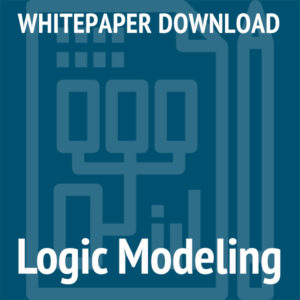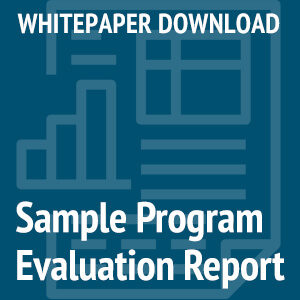We invite you to download the following Whitepapers

Learn about logic models and how developing a logic model helps with both program evaluation and strategic planning.
Introduction
A logic model is a schematic representation of the elements of a program and the program’s resulting effects. A logic model (sometime also known as a “theory of change”) is a useful tool for understanding the way a program or initiative intends to produce the outcomes (i.e. changes) it hopes to produce. Logic models typically consist of a flowchart schematic that shows the logical connection between a program’s 5 key elements, its: “inputs” (i.e. invested resources), “outputs” (program activities and actions), “short-term outcomes” (changes), “medium-term outcomes” (changes), and “long range impacts” (changes).

Read a Sample Program Evaluation Report by Brad Rose Consulting, Inc. All identities in the report have been made anonymous.
Introduction
The University’s ABC Program is a multi-faceted, institutional initiative funded by the XYZ Foundation, that seeks to enhance the university’s’ preparation, and on-going professional development, of teachers. Selected by the Foundation as one of eleven national higher education institutions for participation in the national initiative, the ABC Program has, over the last seven years, sought to create a comprehensive strategy that builds upon its perennial commitment to the preparation of educators, by augmenting and enhancing the university’s capacity for teacher preparation. The ABC Program has endeavored to accomplish this strategy through a three-pronged approach that includes: creating and sustaining a comprehensive ‘culture of evidence,’ redoubling the commitment of the College of Arts and Sciences to teacher education; and creating and sustaining a clinical practice model for, and subsequent long-term commitment to, the professional development of The University’s School of Education graduates.

Learn how to prepare for a program evaluation, including the questions to ask your evaluator and the models that may help you outline a program‘s goals and outcomes.
Introduction
Program evaluation is a systematic method for collecting, analyzing, and using information to answer questions about projects, policies and programs, particularly about their effectiveness and efficiency. (https://en.wikipedia.org/wiki/Program_ evaluation) Michael Quinn Patton, author of Developmental Evaluation, observes that program evaluation is, “The systematic collection of information about the activities, characteristics, and outcomes of programs to make judgments about the program, improve program effectiveness, and/or inform decisions about future programming.” At the heart of program evaluation is the idea that programs produce outcomes, or changes, and that these are valuable and desired. Evaluators thus conduct evaluation research to find out if the desired changes occur.

Learn about all the facets of program evaluation, including what a program evaluation is, the types of program evaluations, what to consider when contemplating a program evaluation, and the advantages of using an external evaluator.
Introduction
Program evaluation is a systematic method for collecting, analyzing, and using information to answer questions about projects, policies and programs, particularly about their effectiveness and efficiency. (https://en.wikipedia.org/wiki/Program_ evaluation) Michael Quinn Patton, author of Developmental Evaluation, observes that program evaluation is, “The systematic collection of information about the activities, characteristics, and outcomes of programs to make judgments about the program, improve program effectiveness, and/or inform decisions about future programming.” At the heart of program evaluation is the idea that programs produce outcomes, or changes, and that these are valuable and desired. Evaluators thus conduct evaluation research to find out if the desired changes occur.
Logic Modeling
Learn about logic models and how developing a logic model helps with both program evaluation and strategic planning.
Introduction
A logic model is a schematic representation of the elements of a program and the program’s resulting effects. A logic model (sometime also known as a “theory of change”) is a useful tool for understanding the way a program or initiative intends to produce the outcomes (i.e. changes) it hopes to produce. Logic models typically consist of a flowchart schematic that shows the logical connection between a program’s 5 key elements, its: “inputs” (i.e. invested resources), “outputs” (program activities and actions), “short-term outcomes” (changes), “medium-term outcomes” (changes), and “long range impacts” (changes).

